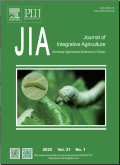首页|期刊导航|农业科学学报(英文)|Effect of chemical regulators on the recovery of leaf physiology,dry matter accumulation and translocation,and yield-related characteristics in winter wheat following dry-hot wind
农业科学学报(英文)2024,Vol.23Issue(1):108-121,14.DOI:10.1016/j.jia.2023.04.019
Effect of chemical regulators on the recovery of leaf physiology,dry matter accumulation and translocation,and yield-related characteristics in winter wheat following dry-hot wind
Effect of chemical regulators on the recovery of leaf physiology,dry matter accumulation and translocation,and yield-related characteristics in winter wheat following dry-hot wind
摘要
关键词
preparation/stress/foliar spraying/grain-filling/remobilizationKey words
preparation/stress/foliar spraying/grain-filling/remobilization引用本文复制引用
Yanan Xu,Yue Wu,Yan Han,Jiqing Song,Wenying Zhang,Wei Han,Binhui Liu,Wenbo Bai..Effect of chemical regulators on the recovery of leaf physiology,dry matter accumulation and translocation,and yield-related characteristics in winter wheat following dry-hot wind[J].农业科学学报(英文),2024,23(1):108-121,14.基金项目
This study was supported by the National Key Research and Development Program of China(2019YFE0197100),the earmarked fund for China Agriculture Research System(CARS-03-01A),and the Agricultural Science and Technology Innovation Project of the Chinese Academy of Agricultural Sciences. (2019YFE0197100)

